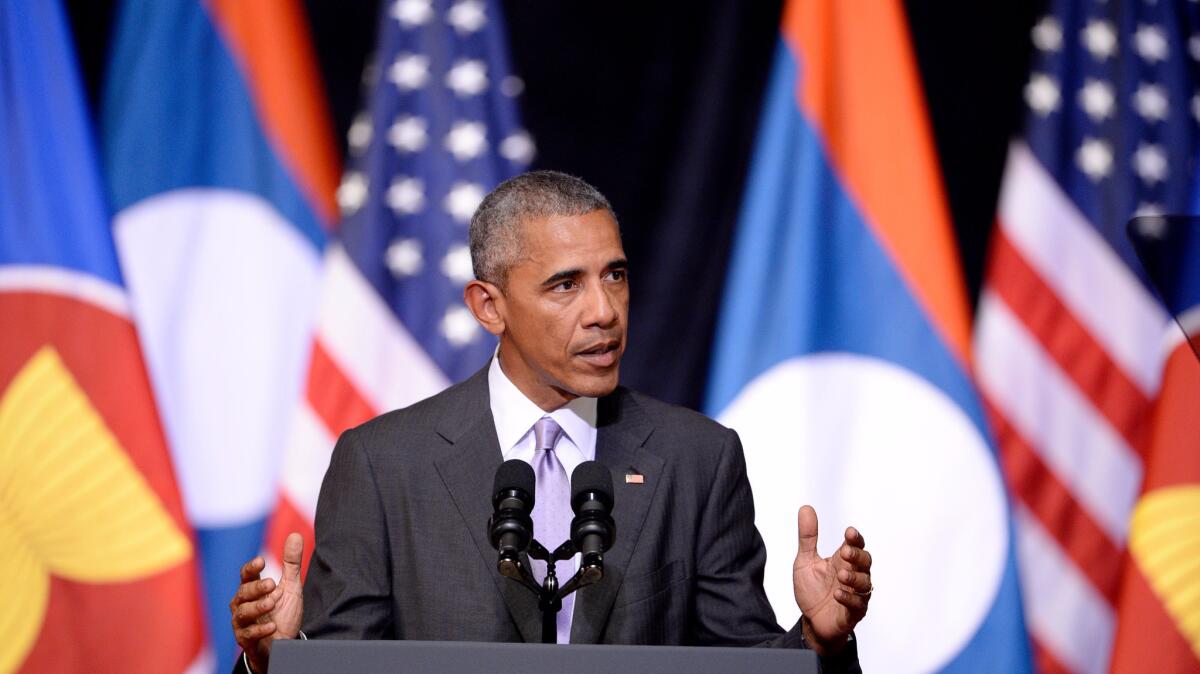Obama tries to sell the Pacific trade pact to nations concerned about its fate

On a weeklong tour of China and Laos, President Obama is trying to reassure anxious foreign partners that even if he waits till after the election to make a big push for his sweeping Pacific Rim trade deal, U.S. politics won’t jeopardize its passage.
A failure by Congress to ratify the Trans Pacific Partnership deal would “call into question America’s leadership” just as a new administration transitions into power, Obama warned Tuesday.
“As difficult as the politics are back home, I will continue to push hard on the U.S. Congress to approve TPP before I leave office because I think it is important for this entire region and it is important for the United States,” he said here as he prepared to meet Wednesday with southeast Asian leaders, including three of 11 also party to the deal.
The president has long projected his trademark cool confidence that the agreement, the largest international trade pact in history, would be approved. But with his potential successors and key congressional players saying otherwise, Obama’s partners are left to wonder whether a deal in the works for more than a decade is about to fall victim to the politics of the frenzied American election.
“If, at the end, waiting at the altar, the bride doesn’t arrive, I think there are people who are going to be very hurt, not just emotionally but really damaged for a long time to come,” Singaporean Prime Minister Lee Hsien Loong said during a recent state visit to the White House.
The TPP, encompassing nearly 40% of the global economy, would help eliminate tariffs and other obstacles for selling American goods in rapidly growing markets while cementing the U.S. as a Pacific power, the White House says, and require tougher labor and environmental standards in nations like Vietnam that have long been accused of undercutting U.S. companies.
Lee’s view indicated why some analysts believe that Asian leaders who follow American politics will need more convincing.
“It’s not easy for them to understand that that’s part of a raucous election process where a lot of things should be taken with a grain of salt,” said John Engler, a former Republican governor of Michigan and president of the Business Roundtable, which is working to build support for the agreement in Congress.
Donald Trump’s criticism of the TPP is a staple of his litany of complaints about Obama. Trump repeatedly says he favors free trade but that the TPP was poorly negotiated, and he has crudely predicted it would be “a rape of our country.”
After taking part in trade talks while Obama’s secretary of State, Hillary Clinton came out against the deal during a tough Democratic primary fight against liberal Vermont Sen. Bernie Sanders. She said she wasn’t confident it would create the jobs its backers predict.
Congressional allies on the issue insist Obama is right to tell trading partners that the fight can still be won.
“I would tell them that their presidential candidates’ rhetoric aside, that there is strong support from both Republicans and Democrats in Congress to resolving the outstanding issues in TPP and bringing it forward for consideration,” House Ways and Means Committee Chairman Kevin Brady (R-Texas) said.
History is on the side of passage.
“We always manage to pass our trade deals,” said Michael J. Green, senior vice president for Asia at the Center for Strategic and International Studies, who negotiated several such pacts as a top advisor to President George W. Bush. “Eventually, they go through.
“So part of the message privately has to be, ‘This is going to happen,’” Green said.
Failure to ratify the TPP would deeply weaken the foreign policy legacy Obama set out to burnish after he was elected to his second term. He was able to score other big achievements without approval from Congress, including deals to limit Iran’s nuclear capabilities, open diplomatic relations with Cuba and cut carbon emissions around the globe.
“He’s going to hear from every Asian leader about the damage this would do to the U.S. in the region,” said Jeffrey Bader, the former top Asia advisor to Obama. “It would be a statement of U.S. disinterest in Asia, at a time when China is a leading trading and investment partner of every country in the region. For the U.S. to be seen as turning its back on Asia like this would be a terrible signal.”
Obama has defied predictions of doom before, including last year on legislation that helped clear the way for the trade agreement. As was the case then, administration officials are ready to fan out across the country and to Capitol Hill in the coming weeks to redouble their lobbying efforts.
“The United States has never had a smooth, uncontroversial path to ratifying trade deals, but they eventually get done,” Obama noted Monday. “It’s my intention to get this one done.”
In addition to reassuring leaders of the other 11 countries involved in the trade talks, Obama is signaling to domestic allies that he’s prepared to fight campaigns to prevent a vote in Congress after the election.
Traditionally, the formula for securing passage of trade deals relies on Republican lawmakers and a minority of Democrats. But many Republicans in Congress appear to be buckling under intense pressure from a party base that increasingly has turned against trade. Opposition to free-trade agreements among GOP voters increased dramatically in the last year, a Pew Research Center poll released in August found, with just 32% holding a positive view compared with 51% in May 2015.
“There’s two reasons for that,” Brady said. “One, we have a disappointing economic recovery where support for trade tends to decrease across party lines. And, the opposition party from whoever is in the White House tends to have more resistance.”
The business community has played a key role in sustaining support among members of Congress, or at least persuading many to keep an open mind through the fall ahead of a possible vote while the White House works to address specific complaints.
“We’ve tried with members of Congress in both parties … to focus on what are the benefits of trade in their own districts,” Engler said. “Everybody wants to get this off the front burner until the next nine weeks have passed.… But our commitment is to continue to work, continue to explain the benefits.”
More than two dozen Democrats in the House of Representatives supported a preliminary vote on the trade deal last summer, and officials say they have seen no indication of that number wavering. The White House has continued to court those lawmakers, inviting several to join Obama on Air Force One to travel to Vietnam in May or the state dinner welcoming Lee last month.
“We are near the finish line, and we hope that the countries — particularly the U.S. — will be able to ratify the TPP as soon as possible,” Lee said during that visit.
Parsons reported from Vientiane and Memoli from Washington.
Follow @cparsons and @mikememoli for news about the White House.
In China, Obama struggles for elusive deal with Russia on Syria
Obama makes progress on climate change, the bright spot in his China policy
Obama’s final major trip to Asia is unlikely to be the victory lap he hoped for








